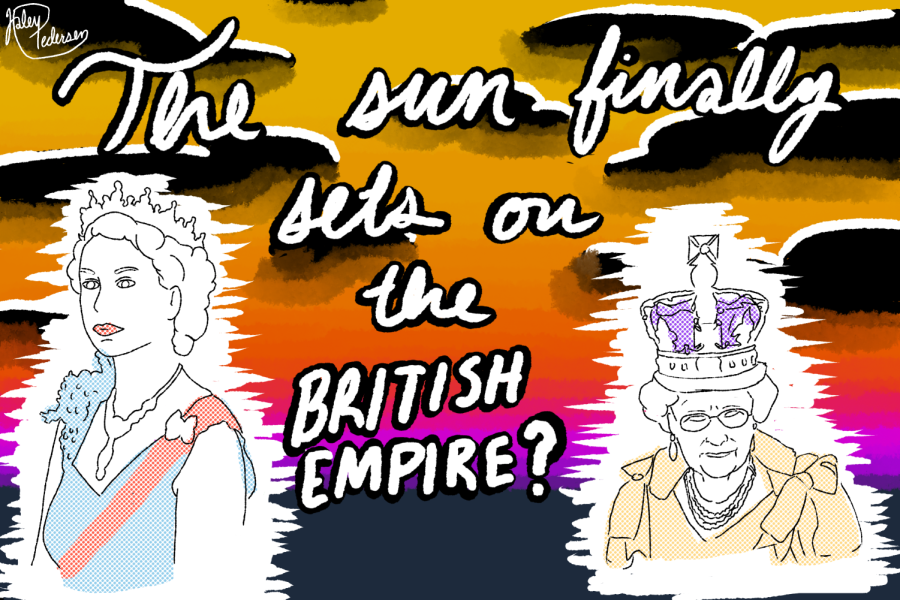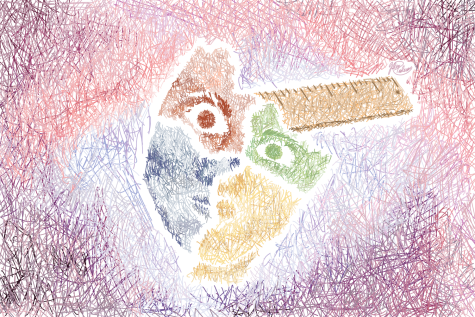The Sun Finally Sets on The British Empire?
The truth behind Queen Elizabeth
Is the Sun Finally Setting on the British Empire?
Old pirates, yes, they rob I
Sold I to the merchant ships
Minutes after they took I
From the bottomless pit
But my hand was made strong
By the hand of the Almighty
We forward in this generation
Triumphantly
Won’t you help to sing
These songs of freedom?
‘Cause all I ever have
Redemption songs
Redemption songs
-from “Redemption Song” by Bob Marley and the Wailers, 1979
In Olaudah Equiano, an enslaved African, and one of America’s first civil rights activist’s autobiography, The Interesting Narrative of the Life of Olaudah Equiano, he wrote of the litany of human rights abuses that Africans were beholden to at the hands of English slave traders. Today, the memoir is a primary example of Europe’s cruel relationship with Africa. England’s 17th and 18th-century18th century development of a slave economy was only the beginning of a centuries-long battle for freedom from the West’s tyranny. In many ways, that battle is still going on today and perhaps can never be fully won.
A look at the broader context and implications which Equiano was born into reveals a diverging pattern. As Europe and eventually, the ‘West’ as a collective body developed, they rose to the top through the oppression of other groups of people. The calamitous effects of Europe’s slave trade were foundational to the rise of imperialism, further institutionalizing the violent legacy of the West into the Global South. It was in this context that Elizabeth II was born, and it is from this point of view that we should look at her life and actions. Rather than sensationalizing her legacy or striking her down for dubious comments or actions, it is best to approach Queen Elizabeth with a more nuanced opinion. It can be easy to forget that our pop-culture figures are no less human than anyone else; anything more or less leads to a manufactured and ingenuine view.
Queen Elizabeth II was born into a world with the English Empire coming off of its early 20th-century peak as an unparalleled world power. In her young life as a princess, she toured the empire and propagated the Crown’s imperial rhetoric. In fact, she learned of her father’s death, clearing the way for her anointment, while she was touring through Kenya. The era in which the Queen came into power in 1953 could perhaps be seen as the beginning of the end for the British Empire, with today’s world powers like India and Australia breaking away in the 40s and tens of others following suit in the 50s, 60s, 70s, and even 80s. Elizabeth II has often been lauded on the front of racial relations for the legacy of independence movements that succeeded in breaking away from Britain throughout her reign. She sought to distance herself and the monarchy from its imperial past and became known for her anti-imperialist ideals; most of Britain’s colonies, which numbered in the fifties, gained independence during her rule.
The Crown continued to maintain some control, however. Queen Elizabeth maintained her position as the head of the British Commonwealth with a significant, though largely symbolic, influence over the nations which separated themselves from their imperial pasts, even as they gained independence. How much influence she had in the oversight of this extension of imperial Britain is unclear, and it could be argued that the Queen’s position in the British Commonwealth was simply a product of history and geopolitical alignments which existed long before and during her life.
That is not to say that Elizabeth II is exempt from any responsibility. Her faults in this regard are twofold—first is her oversight or lack thereof during independence movements while she was in power; the second, and perhaps more direct negligence, was her perpetuation of Britain’s long-standing tradition of historical denial. As Howard W. French, a professor at Columbia University’s school of journalism, says:
There has long existed…historical denial…in Britain—about the importance of slavery to that [country’s] emergence in the modern era as [one of] the richest and most powerful region[s] in the world…. Describing the British empire as an example of ‘benign authoritarianism,’…. [is a] persistent, self-serving myth [which] survives mostly as a result of the deliberate act of not looking too hard…. This empire, born in enslavement, had even less to do with human rights than it did with democracy…. [Queen Elizabeth II] incarnated and ably helped sell her nation and its system while never criticizing or apologizing for any aspect of its past.
The depictions of the Queen as a benign, grounded leader may be true to some, but it was perhaps in her calm demeanor that she became shortsighted to the crimes against humanity that Britain committed before and during her time in power. Some nations and people have trouble feeling nostalgic about the Queen’s legacy when that legacy often meant genocide and suppression ofto them and their ancestors. In Kenya, the Queen’s 70th year in power marks similarly the 70th anniversary of the Mau Mau Rebellion, Kenya’s unforgiving movement towards independence. This era of Kenya’s history is marked by Britain’s numerous crimes against humanity, paralleling in some ways Nazi genocide. During the 1950s, British colonists in Kenya installed detention centers and initiated a system of genocide that included the torture, rape, castration, and murder of tens of thousands of Kenyans in an effort to suppress independence. It bookended more than half a century of subjugation and dehumanization under imperial rule. Where was our benevolent Queen when this was occurring?
Generations and generations of pain, fear, and anxiety
Equality is walking without intuition
Saying the protector and the killer is wearing the same uniform
The revolution is not televised
Media perception is forced down the throats of closed minds
So it’s lies in the headlines
And generations of supremacy resulting in your ignorant, privileged eyes
From “I Can’t Breathe” by HER, 2020
The past five centuries of growing Western domination in the geopolitical sphere came at the cost of unimaginable human suffering at a staggering scale—a legacy stretching from slavery in the Caribbean to imperial dominion in India, from Hong Kong to New Mexico. Europe, and truly the entirety of the Western world, created a tradition of historic denial and erasure of its brutal rise to power. It was only by taking advantage of societies from India to Barbados that Britain was able to grow, a similar story for many of the West’s powers. A diverging path emerged in 1492 and continued to widen as the powers became more dependent on the erosion of society, culture, and prosperity of the states and peoples which they abused.
For this reason, I advocate not indictments of the Queen in a vacuum but critiques of the structures into which the Queen was born into. By acknowledging that the problem extends beyond the person, we can approach the issue effectively. This is not to say that the Queen is blameless under a framework of the world creating the person; rather, we should view the Queen and her position in Britain’s imperial legacy from a more nuanced perspective, making her human and acknowledging our own capability to make significant errors in a similar position. We can acknowledge her issues without turning her into a villain and see the good she did for people without idolizing her.
With that in mind, resistance to the West’s unacknowledged backbone of subjugation and exploitation should be vehement and relentless. It is impossible to combat our society’s past and present crimes without first bringing them to light. We’re at a critical point right now—a new stage of a progressive and ongoing battle against the world’s powers and the atrocities they are based upon.
Barbados formally pulled away from the British Commonwealth in 2021, and there is a question as to whether other states currently under that title will do the same, severing their final ties to imperialism. The remaining states include smaller nations like Antigua and Jamaica in the Caribbean, but it also includes contention closer to home for the Crown—Northern Ireland and Scotland. The realization of separation is likely a when and not an if for many of these Commonwealth nations, but Scotland and to a lesser extent Northern Ireland is undoubtedly the biggest concern to British politics, and each of these countries carries its own legacies and controversies with London.
In the US, closer to home for many of us, a different kind of reckoning is occurring. The summer of 2020 and the re-examination of the darker sides of America’s role in world history brought hope for a coming to terms with that past, but just as throughout American history, progress is met with opposition. The movement across red districts and states to censor and restrict access to themes of equality is one of the scariest developments in recent American history— a chauvinistic populist movement propagated from those in power through inflammatory language and blatant denial, reminiscent of the seeds of racism sown into America’s history from its conception. It is the same cognitive dissonance that prevents people from approaching the Queen and Britain’s place in widespread suffering under imperial rule. Though the common approach to the past is to frame it through rose-colored glasses, ignoring the bloodshed and suffering until it becomes almost a fabrication, blasphemous to mention, never will the West be able to approach issues that are nuanced and have years of unsavory history if we cannot even acknowledge their existence.

Darin Eberhardt '25 has been working with the Advocate since 7th grade and joined the Editorial Board in early 2023. Always finding ways to keep his schedule...

Haley ‘25 is the Advocate’s Graphic Art Editor. Their overall artist career sprouted at a young age from their various dragon sketches and drawings,...







